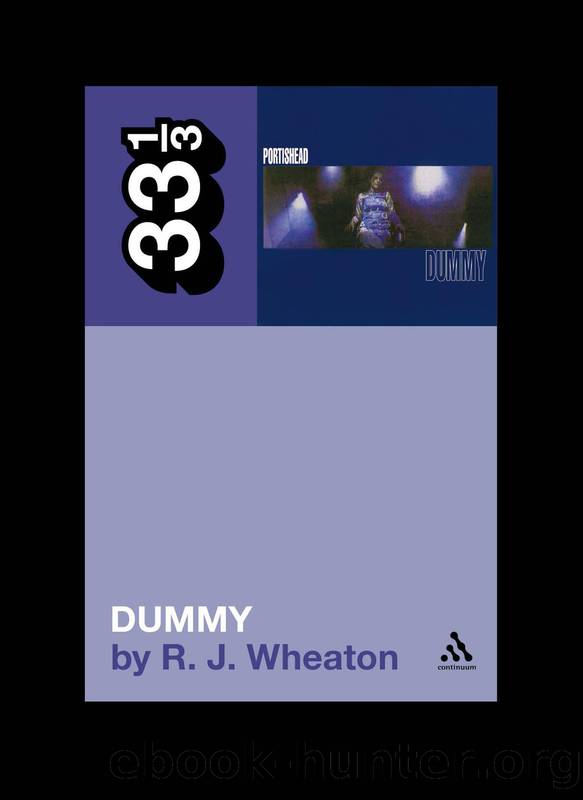Portishead's Dummy (33 13) by RJ Wheaton

Author:RJ Wheaton [Wheaton, RJ]
Language: eng
Format: epub
Publisher: Continuum US
Published: 2011-09-29T05:00:00+00:00
She told Ben Thompson in 1994 that:
The fun for me is finding a tone which goes with the backing track ⦠when Iâm singing âNumb,â to me thatâs me trying to be a black soul singer. At other times I might be trying to be Neil Young or Tom Waits. That might make me false, but I think itâs more honest to admit it. I think if I just found one style and stuck to it, Iâd get very bored. People who do that just end up imitating themselves.175
* * *
There are some great subtleties of meaning. The refrain of âSour Timesâ would be belted out by a lesser singer, but Gibbonsâ restraint renders it instead with a breathy, insouciant delivery, suggesting the possibility of meeting the coldness of the world with an indifference and withdrawal on oneâs own terms. In the same song, after the ghostly meandering of âWho am I? What, and why?â there is the assertion that âAll I have left is my memories of yesterday.â The knife-edge pronunciation of âleftâ sounds almost calculating, which makes the peculiar frailty of the closing half of the line seem instead knowing, toying, coy, suggesting that she controls the disclosure of those memories. A poker player with the cards against her chest.
She is suspicious of given certainties. âThis life ainât fair,â she sings in âIt Could be Sweet,â but the line is almost thrown away, more spoken than intoned; there is a delicious swoop through âYou donât get something for nothinâ,â undercutting the glib certainty of the cliché. Elsewhere she uses tone to puncture aphorism â a hardness, a determination, creeping into âfor time and againâ in âItâs a Fire.â She is always multiplying meaning in this music. In âPedestal,â after the line âYou abandoned meâ â the last syllable drawn into a deadspin of reverberation â there is just enough closeness, just enough softness on the following line â âhow I sufferâ â that for a second it is possible to hear in it some sarcasm.
The self in these lyrics is constantly under pressure from the world around it: âcircumstance will decide,â she sings in âSour Times.â Yet even at the moments of most painful self-abnegation, Gibbons finds a way of suggesting some control; of protecting a core of agency, of action; of withholding the possibility of self-assertion. That comes across in the most flagrant ironies in these lyrics, in the extended refrains of âSour Times,â and âGlory Box.â But it is a level of complexity woven into the fabric of the album. Dummy offers in its approach â systematic, ironic, complex, and compromised â an examination and rejection of so many versions of the modern â female â self, that it makes of this music a protest album, a plea â a cry â for freedom from over-determination by the world outside.
* * *
Download
This site does not store any files on its server. We only index and link to content provided by other sites. Please contact the content providers to delete copyright contents if any and email us, we'll remove relevant links or contents immediately.
Kathy Andrews Collection by Kathy Andrews(10520)
The remains of the day by Kazuo Ishiguro(7551)
Spare by Prince Harry The Duke of Sussex(4199)
Paper Towns by Green John(4169)
The Body: A Guide for Occupants by Bill Bryson(3802)
Be in a Treehouse by Pete Nelson(3213)
Harry Potter and the Goblet Of Fire by J.K. Rowling(3046)
Goodbye Paradise(2964)
Never by Ken Follett(2882)
Into Thin Air by Jon Krakauer(2702)
The Remains of the Day by Kazuo Ishiguro(2619)
The Genius of Japanese Carpentry by Azby Brown(2609)
The Cellar by Natasha Preston(2595)
Drawing Shortcuts: Developing Quick Drawing Skills Using Today's Technology by Leggitt Jim(2532)
120 Days of Sodom by Marquis de Sade(2439)
Architecture 101 by Nicole Bridge(2350)
The Man Who Died Twice by Richard Osman(2300)
Machine Learning at Scale with H2O by Gregory Keys | David Whiting(2292)
Fairy Tale by Stephen King(2071)
